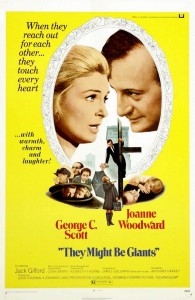Jehovah has the Devil,
Achilles has his Heel,
Mohammed has his Mountain,
Don Quixote has his Windmills;
and SHERLOCK HOLMES,
God bless him,
has his MORIARTY.
— from Watson’s journal
They Might Be Giants (1971) isn’t the usual Sherlock Holmes mystery, but George C. Scott, through the psychotic character of Justin Playfair, thinks he is Holmes. It’s unfortunate the actor never played the character “straight,” as it were, since he could have been one of the great Holmes. Well, even with much behavior atypical of the “real” fictional detective—the often jovial demeanor, the self-deprecation and the flippant platitudes—he resourcefully emerges as one of the best Holmes, modern setting and all.
Scott tackles the role with the same tenacity and attention to characterization that he had exerted in Patton the year before. True to his own artistic standards, it seems he never approached a role with anything less than full concentration and commitment—as in Anatomy of a Murder, Dr. Strangelove, The Hospital and the TV movie A Christmas Carol. Even in a film as foreign to his image and presumed inclination as The Flim Flam Man, he attacks the title character, Mordecai Jones, as though he were a Shakespearian Falstaff or Lysander.
Giants is set at a surprisingly quick pace, thanks to director Anthony Harvey, who four years earlier had directed Peter O’Toole and Katharine Hepburn in the Oscar-winning The Lion In Winter. Both Lion and Giants are scored by John Barry. In Giants the composer is less dramatic and appropriately nostalgic, sure, but his work is also less impressive, though he does capture the bright whimsy of the film.
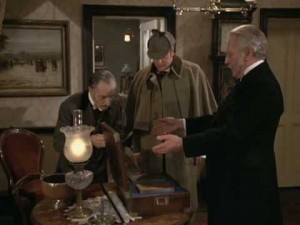 So it is that Justin Playfair, distraught by the death of his wife, has gradually disappeared into the persona of Sherlock Holmes—in dress, in manner, in deductive reasoning, in seeing clues in everything and, above all, never far from his mind, in his pursuit of Moriarty. When Playfair’s sister-in-law Daisy (Rue McClanahan) is asked how often he becomes the detective, she replies, “Oh, all day, every day. He’s never Justin any more.” Holmes has even fixed for himself a cozy, cluttered Sherlockian study complete with laboratory. Handy, too, is the violin upon which he scratches grating nonsense. He tosses it aside. “I absolutely cannot play the thing,” he says to the psychiatrist who has come to analyze him—and, with instructions from her boss, to commit him to maximum security in an institution.
So it is that Justin Playfair, distraught by the death of his wife, has gradually disappeared into the persona of Sherlock Holmes—in dress, in manner, in deductive reasoning, in seeing clues in everything and, above all, never far from his mind, in his pursuit of Moriarty. When Playfair’s sister-in-law Daisy (Rue McClanahan) is asked how often he becomes the detective, she replies, “Oh, all day, every day. He’s never Justin any more.” Holmes has even fixed for himself a cozy, cluttered Sherlockian study complete with laboratory. Handy, too, is the violin upon which he scratches grating nonsense. He tosses it aside. “I absolutely cannot play the thing,” he says to the psychiatrist who has come to analyze him—and, with instructions from her boss, to commit him to maximum security in an institution.
The psychiatrist, identified at first only as “Mildred” (Joanne Woodward), has the tables turned on her. After being with her only a few minutes, and to prove he’s Sherlock Holmes, Playfair lays on her a string of deductions—“you tint your hair and have a vitamin deficiency, you’ve got a temper you can’t control, you think you’re homely and you’re glad you’re growing old” and, perhaps most telling, “no one you’ve loved has ever loved you back.”
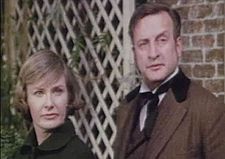 In her defense, she prattles on about her credentials and obligation to cure him, revealing that her last name is Watson. “I mean, good Lord,” he says, “I am the underdog, but are you quite sure you’re Doctor Watson?” Although she’s not the Watson he might have expected or wanted, he encourages her to join him in his search for Moriarty. As Mildred has nothing better to do, she meekly agrees to join him, though there is a telltale eagerness in how she gathers her things. Holmes says that Moriarty is forever present—his evil hidden in dark newspaper headlines, unrecognizable in numerous disguises and reflected in the suffering and alienation of so many lives. The detective called him “the Napoleon of crime” in Sir Arthur Conan Doyle’s “The Final Problem,” the last adventure in the second volume of Holmes stories, The Memoirs of Sherlock Holmes (1894).
In her defense, she prattles on about her credentials and obligation to cure him, revealing that her last name is Watson. “I mean, good Lord,” he says, “I am the underdog, but are you quite sure you’re Doctor Watson?” Although she’s not the Watson he might have expected or wanted, he encourages her to join him in his search for Moriarty. As Mildred has nothing better to do, she meekly agrees to join him, though there is a telltale eagerness in how she gathers her things. Holmes says that Moriarty is forever present—his evil hidden in dark newspaper headlines, unrecognizable in numerous disguises and reflected in the suffering and alienation of so many lives. The detective called him “the Napoleon of crime” in Sir Arthur Conan Doyle’s “The Final Problem,” the last adventure in the second volume of Holmes stories, The Memoirs of Sherlock Holmes (1894).
To prepare her for sleuthing and stealth, Holmes shows her how to “infiltrate,” how to sidle through New York City, slinking alongside building, zigzagging over the sidewalks, peering into doorways, hovering at corners, all in a clipped, jerky walking tempo, and glancing about as if being followed. “I filter,” Holmes says. The accompanying “walking” music is one of the highlights of Barry’s score.
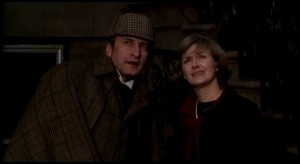 As a subplot, which frequently leads the detective astray, not that he seems to notice or care, Playfair’s brother Blevins wants Justin committed, to gain control of his money. Blevins is being hassled by some blackmailers who demand “twenty grand,” letters clipped and pasted from newspaper headlines, for some sexually compromising photos. Holmes interprets “twenty grand” as an address.
As a subplot, which frequently leads the detective astray, not that he seems to notice or care, Playfair’s brother Blevins wants Justin committed, to gain control of his money. Blevins is being hassled by some blackmailers who demand “twenty grand,” letters clipped and pasted from newspaper headlines, for some sexually compromising photos. Holmes interprets “twenty grand” as an address.
In the ensuing adventures, Holmes and Watson encounter an underground stratum of unhappy, idealistic, confused individuals, either trying to escape a world foreign to them or suffering as helpless victims in it. Much like Holmes—and true of Mildred as well—these people are unable to establish their imagined and imaginary identities in such an unsympathetic modern world.
 In fleeing one of the disruptions they have caused, Holmes and Watson slip through a broken fence into a vacant lot. A policeman (Eugene Roche) rushes in to arrest the pair but recognizes the detective. “Why Mr. Rathbone!” he says. It’s an inside joke that might elude young viewers unfamiliar with perhaps the most famous actor ever to play Sherlock Holmes, and perhaps, as well, an allusion to Basil Rathbone’s eventual discontent with that fame. So linked with this role did he become that people on the street would call him “Mr. Holmes” and insist on the detective’s, not the actor’s, autograph.
In fleeing one of the disruptions they have caused, Holmes and Watson slip through a broken fence into a vacant lot. A policeman (Eugene Roche) rushes in to arrest the pair but recognizes the detective. “Why Mr. Rathbone!” he says. It’s an inside joke that might elude young viewers unfamiliar with perhaps the most famous actor ever to play Sherlock Holmes, and perhaps, as well, an allusion to Basil Rathbone’s eventual discontent with that fame. So linked with this role did he become that people on the street would call him “Mr. Holmes” and insist on the detective’s, not the actor’s, autograph.
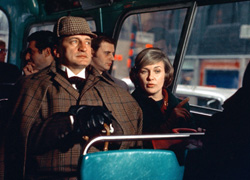 As the result of a sidewalk skirmish, Holmes finds a bag of rubbish marked “Back to School,” which he sees as an inevitable clue. But what kind of school?! Moments later, Mildred implies he’s something of a Don Quixote. He suggests that the zany knight saw “every windmill as a giant, but thinking they might be giants” has produced all sorts of wonderful things, progress that has lifted mankind out of the primeval ooze. It is from this line, and the literary source of Cervantes, that the film acquired its title.
As the result of a sidewalk skirmish, Holmes finds a bag of rubbish marked “Back to School,” which he sees as an inevitable clue. But what kind of school?! Moments later, Mildred implies he’s something of a Don Quixote. He suggests that the zany knight saw “every windmill as a giant, but thinking they might be giants” has produced all sorts of wonderful things, progress that has lifted mankind out of the primeval ooze. It is from this line, and the literary source of Cervantes, that the film acquired its title.
Unlike the authentic Doyle mysteries where clues lead to the solution of cases, here the search is for clues themselves, and the various scenes, however poignant, are the result of dead ends. In the first episode, at a telephone exchange, a young girl tries desperately to reach her suicidal boyfriend despite the operators’ runaround. At a movie theater, Holmes knows most of the itinerant people gathered there, some making it home, others enthralled by the Randolph Scott Western on screen. At an old library, Wilbur Peabody (Jack Gilford) imagines himself to be the Scarlet Pimpernel, fencing a make-believe adversary. In a dilapidated apartment, an elderly couple, Mr. and Mrs. Bagg, have locked out the world since 1939, growing their own topiary garden for food and creative pleasure.
Later, after Mildred has prepared a romantic dinner for Holmes, somehow, through an instinctual calling, all the misbegotten people Holmes and Watson have met on their journey, including policemen, telephone operators, cab drivers, a chestnut vendor, sanitation workers, Wilbur, the Baggs and many others, even Daisy, join in a march against the unseen Moriarty, even trudging past the Metropolitan Opera.
An all-night supermarket provides the setting for the slapstick climax of the movie. Men from the mental institution have captured the marchers, but Holmes commandeers the store’s microphone and announces outlandish bargains. The men in the white coats abandon their prisoners and begin filling shopping carts with goodies. American greed has triumphed again!
